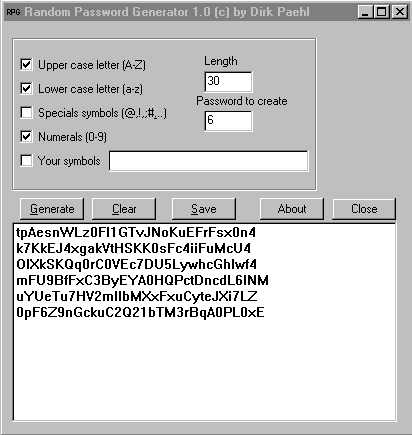

However, to make it more secure we also want it to be longer and with mixed upper and lower cases. It should give you a truly random string roughly 10-13 characters long.
Random password generator 64 bits#
Here we are generating 1 word with 64 bits of random data, and cast it to a base36 string (0-9 and a-z). The idea is the same, we're just utilizing window.crypto instead. However, for reference (and everyone else), I'll show a solution based on an actual CSPRNG. Since you only want passwords 8 characters long, I assume you're not interested in this in any case. Though, please be aware that Math.random() was never designed or meant to be cryptographically secure. Though, you could solve this by simply concatenating two strings, and then slice it back down to 8 characters again. If you are running in an old pre-2016 chrome or pre-2017 safari browser, this might mean (in worst case scenario) you get a shorter password than 8 characters. However, please be aware that different browsers and javascript implementations used to give different bit depth results for Math.random().
Random password generator plus#
The idea is to cast a random number (in the range 0.1) to a base36 string (lowercase a-z plus 0-9), and then fetch the first 8 characters after the leading zero and decimal point. It is advised to never share your passwords, but if you absolutely must, we highly recommend securely sharing your passwords with an encrypted password vault.Real Quick-n-dirty™ Math.random().toString(36).slice(2, 10) Sharing your passwords through unencrypted formats such as Microsoft Teams, Messenger, Slack, Discord, etc., leaves your information at extreme high risk. Don't share passwords in unencrypted formats This attack works on the assumption that people often use the same username and password across multiple sites. A credential stuffing attack is when a cybercriminal takes leaked credentials from one site and uses them on multiple sites in an attempt to gain access to your accounts. Reusing the same passwords puts you at risk of a cyberattack, such as credential stuffing. At least one special character, such as ! # ?.At least 8 characters, and preferably more.Strong passwords should be long, complex and difficult to remember. Your first line of defense against cybercriminals breaking into your online accounts and stealing your personal data is to use strong, one-of-a-kind passwords. Password best practices Don't use personal information in your passwordsĮasy passwords, such as password123 or your dog’s name, are simple to remember but also simple for cybercriminals to crack. Strengthen your organization with zero-trust security and policiesĪchieve industry compliance and audit reporting including SOX and FedRAMP Restrict secure access to authorized users with RBAC and policies Initiate secure remote access with RDP, SSH and other common protocols

Manage and protect SSH keys and digital certificates across your tech stack Securely manage applications and services for users, teams and nodes Protect critical infrastructure, CI/CD pipelines and eliminate secret sprawlĪchieve visibility, control and security across the entire organization Password SharingSecurely share passwords and sensitive information with users and teamsĮnable passwordless authentication for fast, secure access to applications.Seamlessly and quickly strengthen SAML-compliant IdPs, AD and LDAP Protect and manage your organization's passwords, metadata and files


 0 kommentar(er)
0 kommentar(er)
